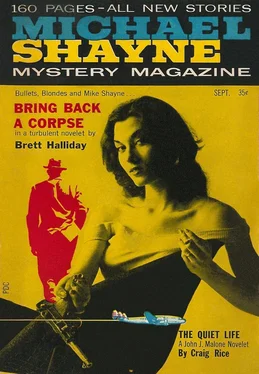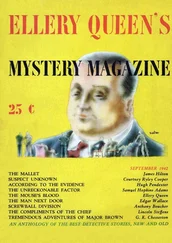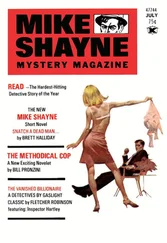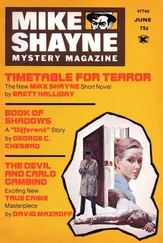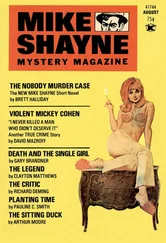Robert Bloch - Michael Shayne Mystery Magazine. Vol. 1, No. 1. September 1956
Здесь есть возможность читать онлайн «Robert Bloch - Michael Shayne Mystery Magazine. Vol. 1, No. 1. September 1956» весь текст электронной книги совершенно бесплатно (целиком полную версию без сокращений). В некоторых случаях можно слушать аудио, скачать через торрент в формате fb2 и присутствует краткое содержание. Город: New York, Год выпуска: 1956, Издательство: Renown Publications, Жанр: Детектив, на английском языке. Описание произведения, (предисловие) а так же отзывы посетителей доступны на портале библиотеки ЛибКат.
- Название:Michael Shayne Mystery Magazine. Vol. 1, No. 1. September 1956
- Автор:
- Издательство:Renown Publications
- Жанр:
- Год:1956
- Город:New York
- ISBN:нет данных
- Рейтинг книги:3 / 5. Голосов: 1
-
Избранное:Добавить в избранное
- Отзывы:
-
Ваша оценка:
- 60
- 1
- 2
- 3
- 4
- 5
Michael Shayne Mystery Magazine. Vol. 1, No. 1. September 1956: краткое содержание, описание и аннотация
Предлагаем к чтению аннотацию, описание, краткое содержание или предисловие (зависит от того, что написал сам автор книги «Michael Shayne Mystery Magazine. Vol. 1, No. 1. September 1956»). Если вы не нашли необходимую информацию о книге — напишите в комментариях, мы постараемся отыскать её.
Michael Shayne Mystery Magazine. Vol. 1, No. 1. September 1956 — читать онлайн бесплатно полную книгу (весь текст) целиком
Ниже представлен текст книги, разбитый по страницам. Система сохранения места последней прочитанной страницы, позволяет с удобством читать онлайн бесплатно книгу «Michael Shayne Mystery Magazine. Vol. 1, No. 1. September 1956», без необходимости каждый раз заново искать на чём Вы остановились. Поставьте закладку, и сможете в любой момент перейти на страницу, на которой закончили чтение.
Интервал:
Закладка:
“Malone,” he said in tones of pure desperation, “I’m in Harry Brown’s apartment. Get over here right away. There’s trouble.”
Malone asked what kind of trouble.
“I can’t tell you over the phone,” von Flanagan replied curtly. Then, in a lower voice, “There’s been a murder.”
“Call the cops,” Malone said with a certain irony.
Von Flanagan didn’t appear to notice the thrust. He said earnestly, “I’m going to, soon as I hang up. Malone, I need you — now!”
Malone hung up, reflecting that things had come to a pretty pass when the head of the Homicide Bureau summoned a lawyer to the scene of a murder before he called the police. He inspected his wallet, borrowed an extra five from Joe the Angel for mad money, hailed a taxi and was on his way.
II
A police car screamed up the street behind him as he crossed the sidewalk toward the unpretentious brick apartment building, but Malone beat the cops to the self-service elevator.
On a sudden thought, as he stepped out of the lift on the sixth floor, he left the door carefully disconnected. He didn’t know what was going on, but it occurred to him that von Flanagan just might want a few minutes of privacy before the law — the rest of the law, Malone corrected himself — arrived on the scene.
The door to Harry Brown’s luxurious apartment stood open. Charlie Binkley, the process server, lay dead on the floor, his head in a pool of blood and a bullet hole through his right eye.
Harry Brown sat in an easy chair, slumped down and looking dazed. Captain Daniel von Flanagan stood in the center of the room, looking frantic and rolling of eye.
“Malone!” von Flanagan gasped. “How is this going to look? I was here! When it happened! How is it going to look in the papers? What am I going to do?”
“What happened?” Malone asked.
“That’s just it,” said the Homicide chief desperately. “I don’t know. Malone—”
“Shut up,” the little lawyer said, but pleasantly. “There isn’t any time to talk.” Or, it occurred to him, for thought either — though it didn’t take much thinking to comprehend the uncomfortable nature of the spot the big police official was in. He asked, “Was your being here a factor in—”
“My being here had nothing to do with this,” von Flanagan interrupted hastily. “Or with him.” He pointed to the body.
Heavy footsteps sounded in the hall. “Don’t say anything,” Malone advised, fast and in a low voice. “You just got here in one hell of a hurry that’s all. Any questions that come up right now — just tell them that I called you. We’ll work the rest out later.”
The look in von Flanagan’s eyes went far beyond mere gratitude. It promised infinite favors for Malone, favors in times to come.
The heavy footsteps reached the door. A loud and angry voice wanted to know just who the hell had left the elevator door ajar and jammed the cage. For the moment it appeared, — this was of greater import than Charlie Binkley’s body on the floor.
No one admitted knowing anything about the elevator door, and the subject was dropped for the moment. The two policemen nodded respectfully to von Flanagan. They told him they’d gotten to the scene as quickly as they could, that the technical boys were on the way. They appeared to assume that von Flanagan had been summoned independently after the killing, that he had promptly called headquarters, that Malone’s presence was a matter for the captain’s discretion.
For the time being, Harry Brown was the focus of attention. The dapper little man in the pinstriped suit sat nervously tapping a cigarette with his long, slender fingers, occasionally passing a hand over shiny black hair which Malone had always suspected was dyed. Harry appeared to be having difficulty finding the right words.
He finally got his story out. Charlie Binkley, he explained, had come to see him on a matter of private business. Under pressure, Harry admitted, that the “business” had to do with the hearing to be conducted on the morrow. He was anxious to learn whether or not certain papers had been served on one Samuel J. Fliegle. What sort of papers? A summons. What sort of hearing on the morrow? The hearing over the fraudulent sale of the All-Northwest Chicago Boxing and Wrestling Club. And what did that have to do with murder? Harry Brown grew a little irritable on that point.
“You stand here nagging,” Harry Brown said, “and the guy who cut Charlie down may still be in the building. We—” with a quick look at the embarrassed von Flanagan— “that is, I chased after him, but he got away down the stairs. Could be he’s still around.”
What did this vanished he look like? Well, it had all happened pretty fast. But he had worn a tan overcoat and a dark hat. And he was tallish. Harry added, “I didn’t see his face.”
One of the policemen left to search the building, looking weary, doubtful and generally morose at his assignment. The other stayed on for the questioning, continuing to take notes while von Flanagan sat and occasionally wiped his brow.
“We’d finished talking,” Harry Brown said. “I was over by the TV set and he was just about to go home. Somebody buzzed the buzzer. I said, ‘See who it is, Charlie,’ and he looked through the peeper. Wham! Somebody shot him right through the eye.”
He dropped his unlighted cigarette, started to pick it up, took out another instead, continued with, “I ran across the room and opened the door. It took a few seconds to get it open, because I had to shove Charlie out of the way. I was just in time to see this character in the brown coat go down the stairs. I chased after him, but he had too big a lead. I tried to get the elevator but it was on another floor. By the time I got it, it was too late.” He added, half-apologetically, “I guess I got excited.”
The police officer muttered something unkind about self-service elevators.
Did Harry Brown have a gun? He did. He produced it without protest to be taken for examination.
That was his whole story. Malone breathed a little easier and observed with wry amusement that von Flanagan did likewise. All the same, von Flanagan was on a hook. And, for that matter, come to think of it, so was John J. Malone.
It would be a simple matter to explain his session with Sam the Finder, who didn’t want to appear at the hearing and had no desire for Charlie Binkley to swear — even without legal proof — that the papers had been served. It would be a simple matter for Malone to tell the story of the black eye, which was all too obviously direct inspiration for the method of Charlie Binkley’s murder. This story, Malone was sure, Sam the Finder had hardly, under the circumstances, confided to anyone else. With these facts educed, and a pick-up order sent out for Sam the Finder, people were not going to ask embarrassing questions as to von Flanagan’s presence on the scene of the crime.
Despite innumerable differences of opinion, von Flanagan had been Malone’s friend since the homicide captain had been a rookie cop, and the famed criminal lawyer working his way through night school by driving a cab. Now, von Flanagan was on a spot.
On the other hand, Sam the Finder was a client.
It was an ethical problem that could hardly be settled in the limited time at his immediate disposal. So Malone compromised.
He signaled von Flanagan with an eyebrow and managed to have a private word with him. “You can tell the press,” he said, both confidingly and confidently, “that you know the identity of the murderer, and that you’ll have him in custody by noon tomorrow.”
Читать дальшеИнтервал:
Закладка:
Похожие книги на «Michael Shayne Mystery Magazine. Vol. 1, No. 1. September 1956»
Представляем Вашему вниманию похожие книги на «Michael Shayne Mystery Magazine. Vol. 1, No. 1. September 1956» списком для выбора. Мы отобрали схожую по названию и смыслу литературу в надежде предоставить читателям больше вариантов отыскать новые, интересные, ещё непрочитанные произведения.
Обсуждение, отзывы о книге «Michael Shayne Mystery Magazine. Vol. 1, No. 1. September 1956» и просто собственные мнения читателей. Оставьте ваши комментарии, напишите, что Вы думаете о произведении, его смысле или главных героях. Укажите что конкретно понравилось, а что нет, и почему Вы так считаете.
